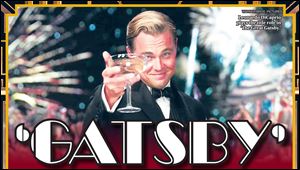
Modern take on ‘Gatsby’ never stops to catch its breath
Baz Luhrmann’s The Great Gatsby is F. Scott Fitzgerald shaped for the ADHD generation.
5/10/2013
The Great Gatsby
Baz Luhrmann’s The Great Gatsby is F. Scott Fitzgerald shaped for the ADHD generation.
The latest adaptation of the Roaring Twenties drama is restless, largely unfocused, and always in motion, as the filmmaker hurries us along from pop-up attraction to pop-up attraction, like a House of Horrors carnival ride, with busy camera shots, machine-gun editing, and a sprint-to-the-finish pace.
If the much-maligned 1974 version with Robert Redford and Mia Farrow is a languid, nodding-off affair, Luhrmann’s film is moviemaking on speed, chased with espresso.
More than most contemporaries, the director maintains a constant presence in his films; Luhrmann’s perpetual-motion movie making is as tangible to audiences as any of his actors onscreen. He backed off that approach for the 2008 bomb Australia, a tedious epic that desperately needed a jolt of hyper, so it’s no surprise that he returns to asserting his style.
Critic’s rating: ★ ★ ½
Jay Gatsby Leonardo DiCaprio
Daisy Buchanan Carey Mulligan
Nick Carraway Tobey Maguire
Tom Buchanan Joel Edgerton
Myrtle Wilson Isla Fisher
But this is the Great American Novel — not a hack Hollywood script in dire need of intervention to disguise its shortcomings. Fitzgerald’s tale of big dreams and broken lives, lies, and love, and the assortment of despicable people caught up in it all, works well enough on its own merits, and the film functions best when Luhrmann dispenses with the showy cinema and simply gets out of the story’s way.
The film opens just as it ends, on a dreamy green light in the distance with voice over narrative by protagonist Nick Carraway as he ruminates and often castigates that fateful summer of 1922, when he rented a small house in a fashionable island 20 miles due east of New York.
Nick (Tobey Maguire) is approaching 30, a World War I veteran, and an English major who found work as a bondman in New York. He’s agreeable and searching for an identity, and by film’s end he’s the only likable soul, a moral refuge from the cruelties and corruption of the well heeled and those who aspire to be.
Playing Nick as meek observer, Maguire initially stumbles in an overly familiar role. But just as Nick evolves into something grander and bolder, Maguire’s performance expands.
Nick is seduced by the wealth and friendship of his reclusive next-door neighbor Jay Gatsby (Leonardo DiCaprio). Gatsby is known for his lavish parties, which Luhrmann stages as elaborate mini-musicals of mostly reimagined contemporary music, but he goes unrecognized by the hundreds of rich and famous who show up uninvited to these soirees. How Gatsby came into his fortune and what he does to keep it is a great mystery to the party-goers, who engage in guessing games about his past. German spy? Decorated soldier? Murderer? As Nick eventually learns, there’s much more to Gatsby than he and others could possibly have imagined.
As Gatsby, DiCaprio is considerably more faithful to Fitzgerald’s text than was Redford’s flat-line performance as suave and more suave. His Gatsby is dashing, as well as nervous, defiant, befuddled, and hopelessly optimistic. He’s human and vulnerable — particularly in his romantic past with Nick’s second cousin Daisy Buchanan (Carey Mulligan). In fact, Gatsby is renting the sprawling mansion directly across the bay from Daisy and her wealthy husband Tom (Joel Edgerton) just to be close to her and win her back.
As a couple in love with wealth and status more than each other, Mulligan and Edgerton deliver in roles that aren’t so likable.
Daisy is that beautiful, warm, and lonely soul so familiar to us, yet she is a tragedy of her own making. Pompous bully Tom is a racist and wannabe intellectual whose moral failings are never fully chastened. As with many of Fitzgerald’s menagerie of the miserable, their decadence is their punishment.
Rounding out the cast is Elizabeth Debicki as Jordan Baker, Daisy’s friend and Nick’s pseudo romantic interest, and Isla Fisher as Tom’s mistress Myrtle Wilson, who is equally unhappy in marriage to a slow-witted mechanic and garage owner named George, played by Jason Clarke, whom Tom cruelly teases with offers of financial help.
A wild party at Tom and Myrtle’s getaway apartment in New York marks the first major transformation for Nick, as he is briefly seduced by this affluent lifestyle.
“Yet high over the city our line of yellow windows must have contributed their share of human secrecy to the casual watcher in the darkening streets, and I was him too, looking up and wondering. I was within and without, simultaneously enchanted and repelled by the inexhaustible variety of life,” Nick recalls of his drunken revelation.
With the novel structured around first-person narrative, Luhrmann and screenwriting collaborator Craig Pearce frequently lift whole passages from Fitzgerald’s work for Nick’s voiceover reflections. In a strange deviation from the book, however, they needlessly explain this narrative as the typed words of Nick when he writes about his summer of madness as doctor-ordered therapy while recovering in a sanitarium.
Otherwise, he and Pearce remain fairly faithful to the novel, with the expected and necessary novel-to-film adaptations and an ending that paints Gatsby as far more alone in the world than even Fitzgerald suggests.
Contact Kirk Baird at kbaird@theblade.com or 419-724-6734.